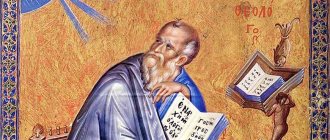Introduction.
This letter is one of the best examples of ancient literature written in epistolary form, not only among the letters of the Apostle Paul himself or the New Testament Scriptures, but in ancient literature in general. It is always placed first in the list of messages of the Apostle Paul, although in time it was not written before the others. And this testifies to its significance from the point of view of both theme and content. Perhaps this message was given special significance because its first readers lived in the capital of the powerful Roman Empire.
Author.
At the beginning of the letter, Paul identifies himself by name (1:1), and the text of this letter itself provides some evidence that it was indeed written by Paul. He says about himself that he is from the tribe of Benjamin (11:1 compare with Phil. 3:5). He sends greetings to Aquila and Priscilla (Rom. 16:3), whom he met in Corinth (Acts 18:2-3) and then parted at Ephesus (Acts 18:18-19) while on his second missionary journey .
Paul also mentions his trip to Jerusalem with “gifts of love,” that is, with donations collected by the churches in Macedonia and Achaia (Rom. 15:25-27); these facts are confirmed in the book of Acts (19:21; 20:1-5; 21:15,17-19), as well as in the letters to the Corinthians (1 Cor. 16:1-5; 2 Cor. 8:1 -12; 9:1-5). Paul also mentions several times his intention to visit Rome (Rom. 1:10-13,15; 15:22-32), and this fact is also confirmed in the book of Acts (19:21).
To whom is it addressed?
The question to whom the apostle is addressing in this letter deserves attention. Paul writes: “To all those who are in Rome, beloved of God, called saints” (Rom. 1:7). Note that he is not addressing the Roman Church. The fact that the church already existed in Rome at that time is beyond doubt - after all, Paul sends greetings to the “house church” that met with Aquila and Priscilla (Rom. 16:3-4). There were probably already several churches in Rome at that time, and perhaps that is why Paul refers to “all saints” and not to “the church.”
But who were these “saints” who lived in Rome, were they pagans or Jews by origin? Obviously both. Aquila, for example, was a Jew (Acts 18:2), and Paul's relatives were Jews: Herodion, Andronicus and Junius (Rom. 16:7,11). According to Josephus and other authors, there were many Jews living in Rome at that time (compare Acts 28:17-28).
However, Rome was, of course, a pagan city, the capital of a pagan empire, where Jews, whether believers or non-believers, formed only a small minority. Further. Although Paul never missed an opportunity to witness and minister to the Jews, God called him to be “an apostle to the Gentiles” (Rom. 11:13 cf. 15:16). So most likely his message was addressed mainly to recent pagans.
This conclusion is confirmed by the evidence contained in the letter itself. On the one hand, Paul directly addresses the Jews (2:17), and when he speaks to Jewish Christians about “Abraham our Father” (4:1,12), he speaks in the first person. But on the other hand, he no less directly states: “I say to you, the Gentiles” (11:13). Several other passages in the letter also indicate that Gentile Christians were part of his audience (11:17-31; 15:14-16). It also indirectly follows from 1:5,13 that pagans predominated in the Christian community of Rome.
But if by the time Paul wrote this letter he had not yet personally been to Rome, then how did Christians appear there? In light of what the apostle writes in 15:20, namely, that his goal was to preach the gospel where the name of Christ had not yet been preached, it seems that none of the other apostles had reached Rome by that time. In particular, Peter was not in Rome at that time - otherwise how can one explain that his name is not among those to whom Paul conveys greetings (chap. 16)?
Here is a possible answer to the question about the founding of the church in Rome: in the crowd that witnessed the miracle on the day of Pentecost in Jerusalem, and which heard Peter preach, there were, as we know, “those who came from Rome” (Acts 2:10); some of them were probably among the 3,000 converts on that momentous day. They returned to Rome as believers in Jesus Christ and began to spread the gospel message.
Then other believers could move to this city, since the capital attracted people from all over the empire, who flocked to Rome for business and other reasons. Aquila and Priscilla are good examples of this. As already stated, they lived in Italy before (Acts 18:2), were forced to leave it and then returned again as soon as circumstances permitted. Thebe (Rom. 16:1-2), which apparently delivered this message to the capital, is the second example.
She did not go to Rome to deliver a message, she took it with her because she was going to this city on some business. It is possible that Thebes' intention to visit Rome became the reason for the Apostle Paul to write this letter. Humanly speaking, the apostle took advantage of the opportunity to come into contact with a group of believers that deeply interested him, with whom he intended to meet in person at the first opportunity.
Just as the absence of the name of Peter among those greeted by Paul in chapter 16 indicates that this apostle was not in Rome at that time, so Paul’s numerous greetings to individuals (he names 28 names) and several groups of believers speaks of his great influence on the Roman church - in its foundation and formation. Among the believers there, many were converted to Christ under his influence or were his assistants in missionary work in different parts of the empire. That is why Paul considered the Christian community in Rome “his own,” as his letter testifies.
Paul, a servant of Jesus Christ, called an Apostle, chosen for the gospel of God, which God had first promised through His prophets in the holy scriptures concerning His Son, who was born of the seed of David according to the flesh and was revealed to be the Son of God with power, according to the Spirit of holiness, through the resurrection from the dead, in Jesus Christ our Lord, through whom we have received grace and apostleship, so that in His name we might subdue all nations to the faith, among whom you are, called by Jesus Christ, to all those who are in Rome, beloved of God, called saints: grace to you and peace from God our Father and the Lord Jesus Christ.
First of all, I thank my God through Jesus Christ for all of you, that your faith is proclaimed throughout the whole world. God is my witness, whom I serve with my spirit in the gospel of His Son, that I constantly remember you, always asking in my prayers that the will of God may one day bring me to come to you, for I greatly desire to see you in order to bestow upon you some spiritual gift. to your confirmation, that is, to be comforted with you by the common faith, yours and mine.
I do not want, brethren, to leave you in ignorance that I intended to come to you many times (but have encountered obstacles even until now) so that I might have some fruit among you, as well as among other nations. I owe both Greeks and barbarians, wise men and ignorant. So, as for me, I am ready to preach the gospel to you who are in Rome. For I am not ashamed of the gospel of Christ, because it is the power of God for salvation to everyone who believes, first to the Jew, then to the Greek. In it the truth of God is revealed from faith to faith, as it is written: “The righteous shall live by faith.”
For the wrath of God is revealed from heaven against all ungodliness and unrighteousness of men, who suppress the truth through unrighteousness. For what can be known about God is obvious to them, because God has revealed it to them. For His invisible things, His eternal power and Godhead, have been visible from the creation of the world through the consideration of creatures, so that they are irresistible. But how, having come to know God, they did not glorify Him as God and did not give thanks, but became futile in their speculations, and their foolish hearts were darkened; calling themselves wise, they became fools, and changed the glory of the incorruptible God into an image made like corruptible man, and birds, and four-footed creatures, and reptiles - then God gave them up in the lusts of their hearts to uncleanness, so that they defiled their very bodies.
They exchanged the truth of God for a lie, and worshiped and served the creature instead of the Creator, Who is blessed forever, amen. Therefore, God gave them over to shameful passions: their women replaced natural use with unnatural; Likewise, men, abandoning the natural use of the female sex, were inflamed with lust for one another, men committing shame on men and receiving in themselves due retribution for their error.
And even though they did not care to have God in their minds, God gave them over to a depraved mind - to do lewd things, so that they are filled with all unrighteousness, fornication, wickedness, covetousness, malice, filled with envy, murder, strife, deceit, evil spirits, slanderers, slanderers, haters of God, offenders, self-praisers, proud, resourceful for evil, disobedient to parents, reckless, treacherous, unloving, irreconcilable, unmerciful. They know the righteous judgment of God, that those who do such things are worthy of death; however, not only do they do them, but they also approve of those who do them.
Place and time of writing.
Although Paul never mentioned the city he was in at the time, there is no doubt that he wrote this letter from Corinth, whose eastern harbor was Cenchrea (16:1). The letter was written at the end of Paul's third missionary journey, when the apostle lived for three months in Greece (Hellas, Acts 20:3), that is, before returning to Jerusalem with donations collected in Macedonia and Achaia for the needy believers of the Jerusalem church ( Rom. 15:26). From Corinth, Paul went to Philippi, where he remained through the Passover and the Days of Unleavened Bread (Acts 20:6), intending to reach Jerusalem by the Day of Pentecost (Acts 20:16). Thus, the Epistle to the Romans was written by him either at the end of winter or at the beginning of spring, in 57 or 58.
Paul's letter to the Romans - read, listen.
On our website you can read or listen to the Epistle to the Romans. The message consists of 16 chapters.
Authorship and time of writing.
The Epistle to the Romans has the first place among all the epistles of the Apostle, although in time it is not the earliest. Biblical scholars date the writing of the Epistle of St. Apostle Paul to the Romans to the year 58. The probable place of writing is Corinth. The book of Romans was probably written towards the end of Paul's third missionary journey.
The authenticity of the message is beyond doubt. The Epistle to the Romans has always enjoyed great authority among the Fathers of the Church. At the beginning of the letter, Paul identifies himself by name. The last chapter of the Epistle says that it was written down by the Apostle’s disciple, Tertius, from the words of Paul himself. Other evidence in the text also favors Pauline authorship.
The main themes of Paul's letter to the Romans.
In his Message, the author raised many topics that were important for Christian theology on the path of its formation. Paul paid special attention to one of the sources of the main disagreements in the Church of that time - the Mosaic Law for the Gentiles who entered the Church.
The second most important theme that the Apostle Paul raises in his letter to the Romans is Israel's response to the spread of the Good News.
The final chapters of the Epistle provide instructions to the Christians of the Roman community.
Purpose of writing.
While the reason for writing the letter was undoubtedly Thebes's planned trip to Rome (Rom. 16:2), Paul had several reasons or purposes for writing it. And the main one, apparently, was to inform the believers there of his intention to visit Rome after he had been in Jerusalem (15:24,28-29 compare with Acts 19:21), and thereby prepare the Roman community upon his arrival.
The believers in Rome were always dear to Paul, and he constantly prayed for them (Rom. 1:9-10); now, at last, his desire to visit and minister to them was to be realized (1:11-15; 15:22-23,29,32). That is why the apostle wanted to notify them in advance of his plans - so that they too would pray for their fulfillment (15:30-32).
The second purpose was to explain more fully and in detail to the Roman believers the essence of the Gospel message that he preached. Paul writes: “Therefore, as for me, I am ready to preach the gospel also to you who are in Rome” (Rom. 1:15), and this is what he wanted to bring to their attention. So in this letter, the Apostle Paul accomplished what Jude would have done: “to write to you concerning the common salvation” (Jude 1:3). It is quite possible that Jude did not write on this topic precisely because Paul had already done so.
The Epistle to the Romans undoubtedly contains a fairly complete and logical presentation of the plan of the Triune God for the salvation of mankind - starting from the condemnation of man for the Fall and to the completion of this plan, which provides for the eternal presence in the presence of God of those people who become like the Son of God, the Lord Jesus Christ.
The third purpose or reason is not as obvious as the first two. It was obviously connected with the tense relations that arose in the Roman Christian community between Jews and pagans, and even with a possible conflict between them. The Apostle Paul was literally persecuted by the Jews, who, following him from city to city, tried to sow doubt in his converts about the freedom given to them by the Gospel (Gal. 5:1). The classic, although not the only, response of Paul to the Judaizers is his letter to the Galatians.
Around the time the book of Romans was written, the attacks of the Jews against the apostle became physical (Acts 20:3). Whether or not the Judaizers managed to come to Rome before Paul, judging by his Epistle to the Romans, the disagreements between Jews and pagans were quite serious in the imperial capital.
The apostle does not take any one side, but carefully analyzes the problem that has arisen from both, so to speak, points of view. On the one hand, he emphasizes the historical and chronological priority of the Jews: “first to the Jew, then also to the Greek” (Rom. 1:16 compare with 2:9-10). He also talks about the advantage of “being a Jew,” explaining the reasons for this advantage (Rom. 3:1-2; 9:4-5).
But on the other hand, he points out that since there is only “one God” (3:30), then He is, of course, the God not only of the Jews, but also of the Gentiles (Rom. 3:29). Yes, Jews have “advantages,” but they also don’t have them, because “both Jews and Greeks are all under sin” (Rom. 3:9), and therefore both can be saved only by faith in Lord Jesus Christ and His atoning sacrifice.
Further, while extending His mercy to all human beings, God temporarily suspended His special plan for Israel as His chosen people, because the leaders of the Jews, and the entire people in general, in their unbelief rejected God's Son as the Messiah. But even at this time, God preserves a God-fearing “remnant” (Rom. 11:5), “until the full number of the Gentiles has come in” (Rom. 11:25). After this, God will once again restore Israel's position as the chosen people.
The underlying theme of tension between Jew and Gentile that runs throughout this letter is a deep-sounding doubt about the generosity, wisdom, and justice of God as manifested in His plan for the salvation of mankind. They did not murmur against God out loud, but this murmur was implied. This is why the letter to the Romans was more than Paul's exposition of his "Gospel of the grace of God" (Acts 20:24) and more than a proclamation of God's plan of salvation for mankind by grace through faith.
It is a theological and apologetic message aimed at explaining both the character of God and His plan for the salvation of the human race. Paul writes about God: “that He may appear just and the justifier of the one who believes in Jesus” (Rom. 3:26). “Oh, the depth of the riches, wisdom and knowledge of God” (11:33), exclaims the apostle and affirms, turning to his readers: “God is faithful, but every man is a liar” (3:4).
Content
The message is clearly divided into 5 parts.
- Introduction (1:1-17);
- the universality of sin (1:18-3:20);
- the universal power of saving grace (3:21-8:39);
- life in Christ (12:1-15:13);
- conclusion and greetings (15:14-16:24).
This orderly plan is disrupted only by a special historiosophical excursion about the fate of Israel and pagan Christians (9-11). Mn. commentators suggest that St. Paul inserted text here from his special. messages on this topic, but it is equally possible that his thought naturally deviated from the main current.
First, the apostle gives a terrifying picture of the moral decline of antiquity. society, a picture that is fully confirmed by the evidence of Greco-Roman authors (Petronius, Martial, Juvenal, Suetonius, Tacitus). The apostle examines this corruption of the tongue. world as a result of its rejection of the true God, Who can be known from creation. Lacking a higher revelation, the pagans received conscience as a kind of God's law, but they neglected this law. At first glance, such a verdict on paganism does not go beyond the framework of the attitude of Jews towards foreigners. But from the 2nd chapter. this illusion dissipates. Apostle Paul shows that those who have been given God's Law also live in contradiction to it. In Scripture itself and in real life, Paul finds confirmation that “all have gone astray.” The hypocritical complacency of the Jews, proud of their piety, is worth morals. the debauchery of the pagans. The “Law of Conscience” and God’s written Law were not enough to overcome the common disease of humanity.
Salvation, the apostle further says, comes from Jesus Christ “independent of the law.” It is not achieved by morals. through human efforts, but is given “freely” by the grace of the Savior. Only He can justify people, cleanse them from sin. The power of His “justification” is universal, extending to “those who are circumcised by faith and the uncircumcised by faith.” Anticipating the question whether Scripture is not destroyed by this, the apostle cites the story of Abraham from the Book of Genesis. What is the Old Testament based on? community? Not on Abraham's merits, but on his trust in God, in His promise. For the sake of this faith, circumcision was given as a sign of participation in the community of the faithful. Faith preceded circumcision. But now the object of faith is no longer the promise of God, but the saving feat of Jesus Christ. His mission is broader than the mission of Abraham and Moses. He is a universal mystery. Christ is not the new Abraham and not the new Moses; He is the new Adam. Just as ancient Adam personified fallen humanity, Christ saves and embraces the reborn world, laying the foundation for a new humanity. The power of God is revealed in His atonement. Man needed the law so that he could see morals. ideal and realized his powerlessness to fulfill it. The statutes of the Law only sharpened the consciousness of sinfulness. Paradoxically, the “holy” Law (7:12) aggravated sin, which continued to reign among people.
Sin stood as an obstacle to man's immortality as determined by God. But now the promised eschatological has arrived. era. God appeared in Christ Jesus, and by uniting with Him, the faithful gain new life and a guarantee of immortality. The old man must die and be born a new one, clothed in Christ. But such a person is no longer bound by the obligations of the Law. He is like a widow who became free after the death of her husband. Everything that was former dies with him when he unites with the Crucified and Risen One. From now on, it is not simple obedience to the commandments that animates the believer, but unity with the Sinless One. Faith in Christ opens up a completely new existence for a person. He no longer lives “according to the flesh,” but “according to the Spirit.” And this transformation of man will over time have an impact on the entire creation. In the person of the renewed “sons of God,” she “will be freed from slavery.” Historiosophical excursion ch. 9-11 explains why the Good News was not accepted by Israel as a whole, although they were given “adoption, and glory, and covenants, and laws, and worship, and promises; theirs are the fathers, and from them is Christ according to the flesh, who is God above all.” First, the true Israelites are only the faithful *remnant. Secondly, the “hardening” of Israel providentially contributed to the mass conversion of the pagans. But since the promises are certain, sooner or later “all Israel will be saved.” All this, however, does not mean that God is partial. In the new life, in the life “in Christ,” “there is no difference between Jew and Greek, because there is one Lord for all.”
In the 4th part of Rome, the apostle shows that life in Christ requires a person to be willing to accept salvation. Here the commandments regain their power and meaning. But this is not just a repetition of the Old Testament. commandments, but their transformation in the light of the Gospel. “Be kind to one another with brotherly tenderness...” the apostle calls on Christians, “be fervent in spirit; Serve the Lord, be comforted by hope; be patient in sorrow, constant in prayer; take part in the needs of the saints... Bless your persecutors; bless, not curse. Rejoice with those who rejoice and weep with those who weep. Be of the same mind among yourselves... If it is possible on your part, be at peace with all people” (12:10-18). In other words, the basis of Christian ethics is love. A lover should be lenient towards those who still attach importance to old rituals and prohibitions. “It is better not to eat meat, not to drink wine, and not to do anything that causes your brother to stumble, or to be offended, or to faint” (14:21). This condescension is an act of love, which puts an end to all strife. It is the highest that a person can bring in response to the love of Christ the Savior.
Subject of the message.
From the three goals of the message mentioned above, especially from the 2nd and 3rd, its theme follows. If we formulate it in simplified and general terms, then this is the gospel of Christ (1:16). More specifically, Paul writes on the topic of “the righteousness of God”, which is revealed in this gospel and received by faith (1:17).
This “truth” or righteousness, firstly, is inherent in God Himself and is manifested in all His actions, and secondly, God gives this righteousness to man by grace, through faith. This includes a person receiving both justification before God and the ability to live an increasingly righteous life; the latter is given to him thanks to regeneration by the Holy Spirit of God and the fact that the Spirit dwells in the believer (renewal and sanctification).
His righteousness in everyday existence becomes more and more perfect and more and more corresponds to the justification received by man (glorification), because the believer in Jesus Christ, having received through His death and resurrection “adoption, the redemption of the body” (8:23), is in the presence of God, becoming “conformed to the image of His Son” (8:29).
God's plan for the salvation of people cannot fail to be fulfilled, since He Himself is doing the work, and He “who began a good work in you will complete it until the day of Jesus Christ” (Phil. 1:6).








